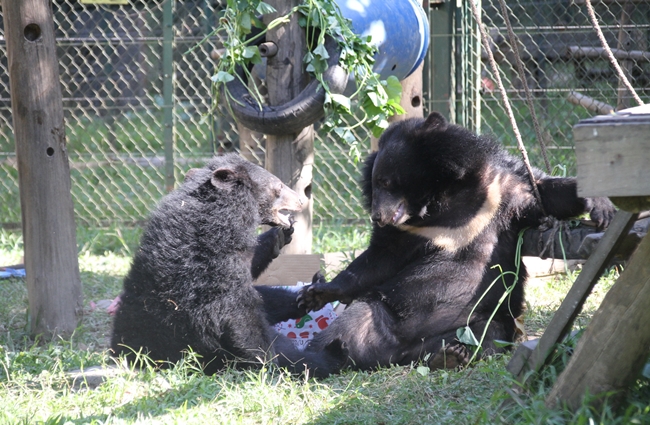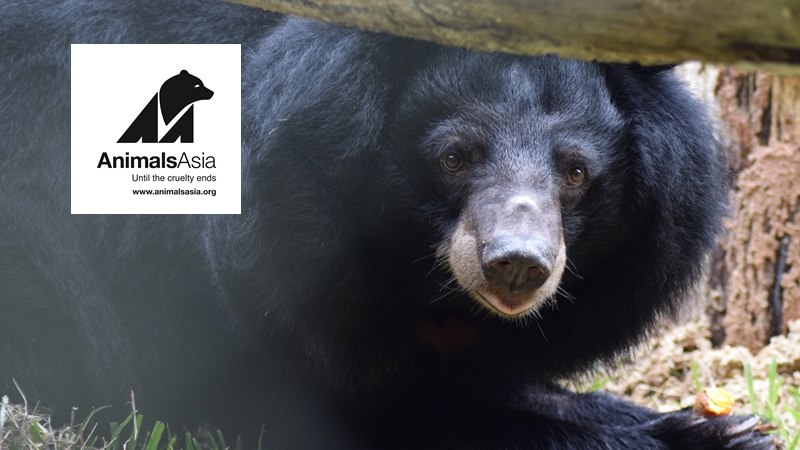Project: Liberation of Asian bears incarcerated by the bear bile trade in Vietnam
2020 fund-raising target: £11,400 GBP
2020 donation: £17,500 GBP
More info: animalsasia.org
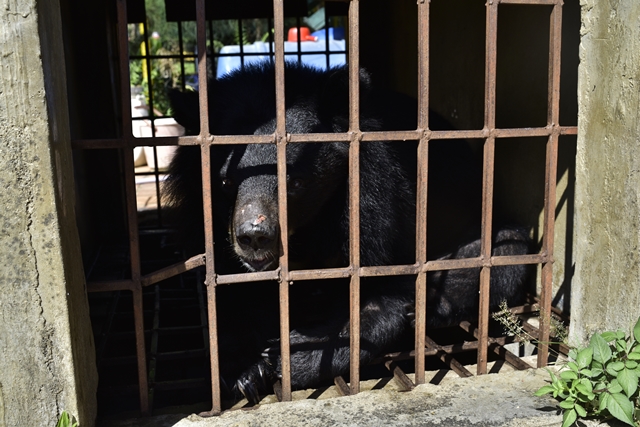
In 2020 Explorers Against Extinction is delighted to partner with Animals Asia in order to highlight bear bile farming, a traditional practice in China and Vietnam. We want to help Animals Asia to rescue bears, and end their suffering. Rescued bears will be homed in Animals Asia award-winning Vietnam Bear Rescue Centre.
The Vietnam Bear Rescue Centre can only care for 200 bears at a time and currently there are just 17 places remaining (as of February 2020). We’ve pledged to help with the associated rescue costs (including food, medicine, expert staff and transport) to bring the centre to its full capacity by the end of 2021.
These incarcerated bears are suffering terribly. We can change that and give them a chance to live a happy, healthy life once more at the Animals Asia Bear Rescue Centre.
December 2020 update: thanks to a very successful Sketch for Survival campaign we are delighted to be able to increase support for Animals Asia by more than 50%, donating £17,500.
Image: Phuong before rescue
About Animals Asia
Animals Asia is devoted to ending bear bile farming and improving the welfare of animals across Asia. They promote compassion and respect for all animals and work to bring about long-term change.
Founded in 1998, the Animals Asia team has been rescuing bears since 1994 and operate award-winning sanctuaries in China and Vietnam. They are the only organisation with a bear sanctuary in China. Founder and CEO, Jill Robinson MBE, is widely recognised as the world’s leading authority on the cruel bear bile industry, having campaigned against it since 1993.
Animals Asia focus on three programmes:
End Bear Bile Farming
Animals Asia works to end the bear bile trade, which sees over 10,000 bears – mainly moon bears but also sun bears and brown bears – kept on bile farms across Asia. It has rescued more than 600 bears since it was established.
Cat and Dog Welfare
Animals Asia works to end the trade in dogs and cats for food in China, collaborates with governments and NGOs to improve the welfare of companion animals, and promotes humane population management.
Captive Animal Welfare
Animals Asia campaigns for an end to abusive animal practices in zoos and safari parks in South-east Asia, and works closely with governing authorities to improve animal management and increase awareness of the welfare needs of captive wild animals.
Images: Tuan before and after rescue
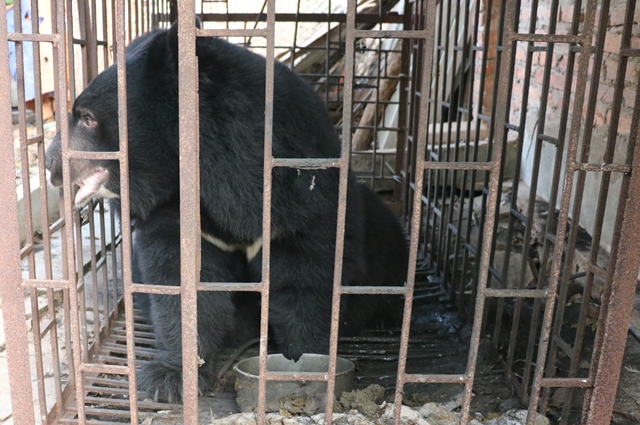

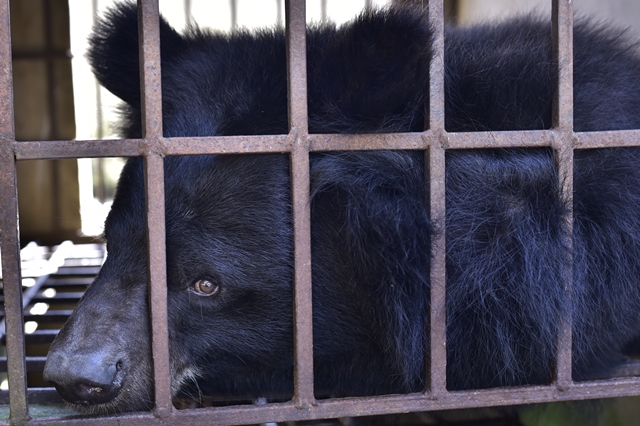
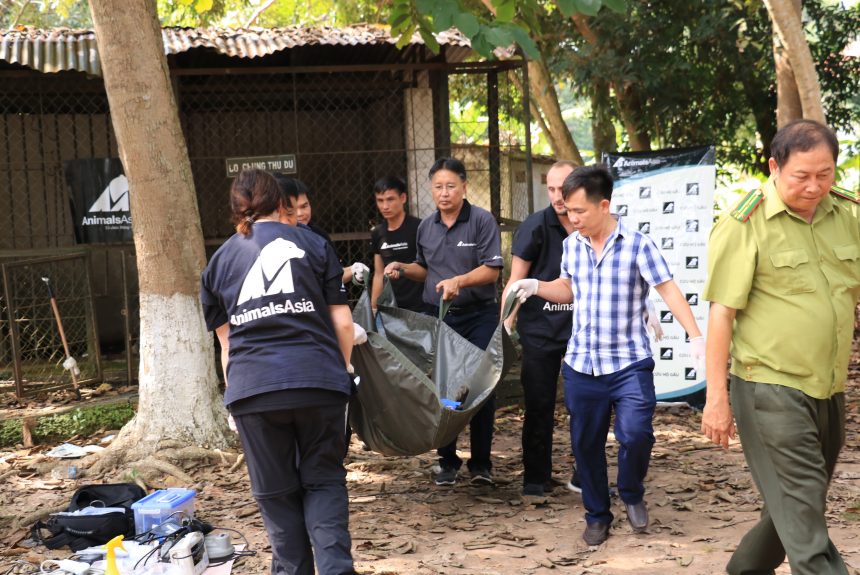
The Brutality of Bear Bile Farming
Over 10,000 bears – mainly moon bears but also sun bears and brown bears – are held in captivity on farms in Asia to have bile extracted from their gall bladders on a regular basis, for profit. The medicinally active ingredient of bear bile is ursodeoxycholic acid (UDCA) and it is used to treat a range of conditions including fever and inflammation by Traditional Chinese Medicine Practitioners. However there are synthesised and herbal alternatives to UDCA readily available.
Most farmed bears are kept in tiny cages, sometimes so small that the bears are unable to turn around or stand on all fours. Some bears are put into cages as cubs and never leave them, existing for up to 30 years under these conditions. Often they grow too large to be removed through the cage door upon rescue, and bear the scars of the tight cage bars on their bodies. This not only has a severe impact on their physical health, but also on their psychological well-being.
Bear bile is collected by means of various, invasive extraction methods, all of which cause massive infections in the bears. Most farmed bears are starved, dehydrated and suffering from multiple diseases and malignant tumours that contaminate their bile and ultimately kill them. Very few receive appropriate medication or any type of veterinary care. Animals Asia has also seen instances of old or very sick bears – those who fail to produce bile – simply left to starve to death in their cages.
Moon Bears (Asiatic Black Bears) , Sun Bears and certain Asian Brown Bears are all endangered with their numbers decreasing. This is due to habitat loss and also the demand for bear bile and bear products. All international trade in bile from Asiatic Black Bears, including farmed bile, is illegal under CITES.
Image: Scooby before rescue; Aurora being carried from her cage after being freed.
Bear Rescue
Most rescue missions happen fast and with little warning. Working in partnership with the government and other organisations Animals Asia get notified that help is needed, and jump into action.
A bear rescue mission involves:
|
Animals Asia has a long history of rescuing bears from captivity and are experts in providing the right care.
As a result of the abuse these bears have suffered they can never be returned to the wild but they can live out a happy, pain-free and healthy life in the sanctuary where they enjoy a nutritious diet and can forage, socialise, take a dip in the pool and climb – all the things bears love to do.
Image: Aurora receiving health check during rescue; Aurora’s first time back on grass after care at the sanctuary.
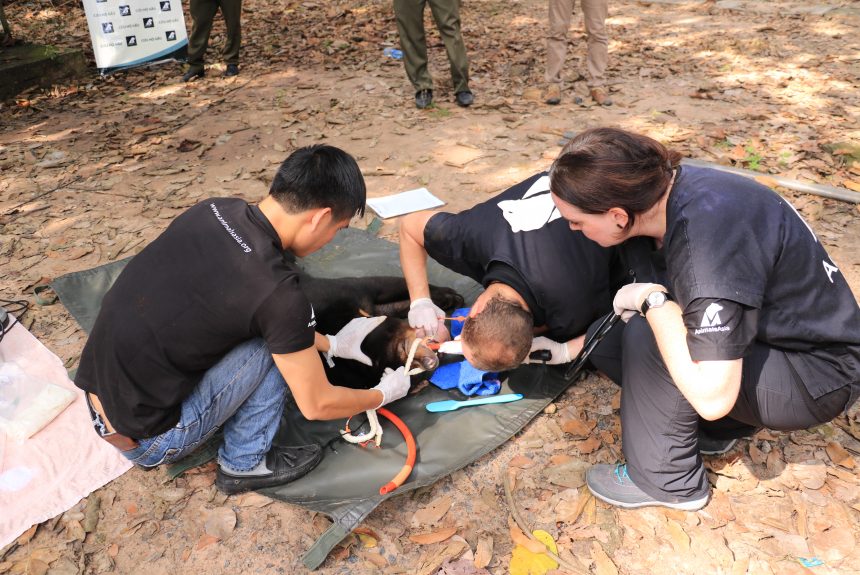
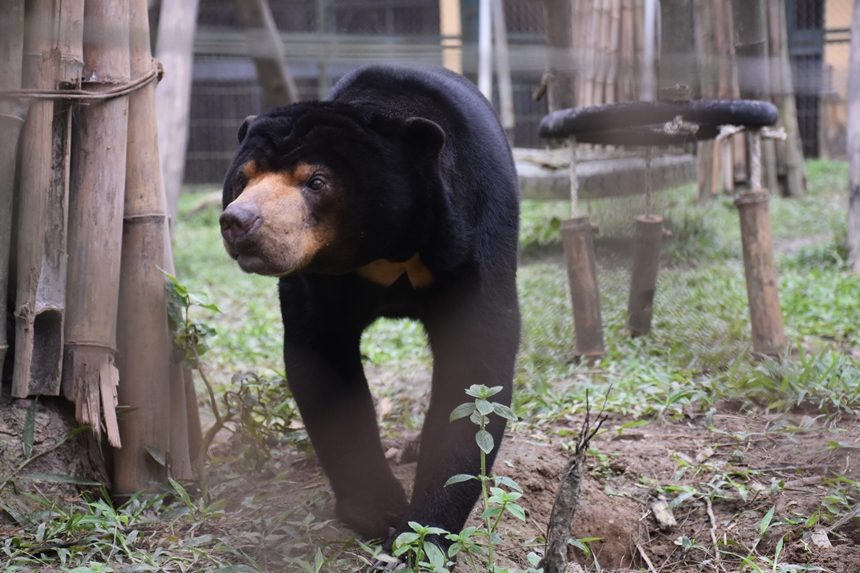
Ending Bear Bile Farming in Vietnam
After years of cooperation, Animals Asia has signed a Memorandum of Understanding with the Vietnam Government to completely end Bear Bile Farming in Vietnam by 2022. This includes rescuing and rehoming approximately 600 bears that remain on farms in Vietnam, where bear bile farming is illegal. In China, they also have consensus from the authorities to work towards the ending of the trade, allowing them to operate two bear rescue facilities in Chengdu and Nanning. They continue to work with the farmers, the government, traditional medical associations and community to build trust and awareness around the animal welfare issues associated with the trade, highlight the dangers that consumption of wildlife products like bear bile present to humans, and promote the use of synthetic and plant based substitutes to bear bile as a more humane alternative. This comprehensive approach has meant that they have made great progress in ending the torture of these bears and safeguarding the remaining wild bear population.
Image: Sugar & Spice relaxing at the Animals Asia Vietnam Sanctuary.
